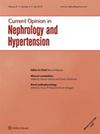Role of NCC in the pathophysiology of hypertension in primary aldosteronism.
IF 2.2
3区 医学
Q3 PERIPHERAL VASCULAR DISEASE
Current Opinion in Nephrology and Hypertension
Pub Date : 2023-09-01
DOI:10.1097/MNH.0000000000000910
引用次数: 0
Abstract
PURPOSE OF REVIEW An increasing amount of evidence points out to a role for the thiazide-sensitive Na+:Cl- cotransporter, NCC, in the blood pressure alterations observed in conditions of pathologically high or pathologically low aldosterone. Here, we briefly review this evidence that is changing our perception of the pathophysiology of primary aldosteronism. RECENT FINDINGS Although initially NCC was thought to be a direct target of aldosterone, more recent evidence suggests that NCC is only indirectly regulated by aldosterone, at least in a chronic setting. Aldosterone-induced changes in plasma K+ concentration that are prompted by the modulation of K+ secretion in principal cells of the connecting tubule and collecting duct are actually responsible for the modulation of NCC in conditions of altered aldosterone levels. A mounting amount of evidence suggests that this indirect effect of aldosterone on NCC may be key to produce the blood pressure alterations observed in aldosterone excess or aldosterone deficit. Finally, recent insights into the molecular pathways involved in NCC modulation by K+ are briefly reviewed. SUMMARY The evidence reviewed here suggests that correction of K+ alterations in patients with hyper or hypoaldosteronism may substantially affect blood pressure levels. Mechanistically, this may be related to the K+-mediated modulation of NCC.NCC在原发性醛固酮增多症高血压病理生理中的作用。
综述目的:越来越多的证据指出噻嗪类药物敏感的Na+:Cl-共转运体(NCC)在病理性高或病理性低醛固酮条件下观察到的血压变化中起作用。在这里,我们简要回顾了这些证据,这些证据正在改变我们对原发性醛固酮增多症的病理生理学看法。最近的发现:虽然最初认为NCC是醛固酮的直接靶点,但最近的证据表明NCC仅间接受醛固酮调节,至少在慢性环境下是这样。醛固酮诱导的血浆K+浓度变化是由连接小管和集管主要细胞K+分泌的调节引起的,实际上是在醛固酮水平改变的情况下调节NCC的原因。越来越多的证据表明,醛固酮对NCC的这种间接影响可能是醛固酮过量或不足时观察到的血压变化的关键。最后,简要回顾了最近对K+调节NCC的分子途径的见解。总结:本文回顾的证据表明,醛固酮增多症患者纠正K+改变可能会显著影响血压水平。从机制上讲,这可能与K+介导的NCC调节有关。
本文章由计算机程序翻译,如有差异,请以英文原文为准。
求助全文
约1分钟内获得全文
求助全文
来源期刊
CiteScore
5.70
自引率
6.20%
发文量
132
审稿时长
6-12 weeks
期刊介绍:
A reader-friendly resource, Current Opinion in Nephrology and Hypertension provides an up-to-date account of the most important advances in the field of nephrology and hypertension. Each issue contains either two or three sections delivering a diverse and comprehensive coverage of all the key issues, including pathophysiology of hypertension, circulation and hemodynamics, and clinical nephrology. Current Opinion in Nephrology and Hypertension is an indispensable journal for the busy clinician, researcher or student.

 求助内容:
求助内容: 应助结果提醒方式:
应助结果提醒方式:


